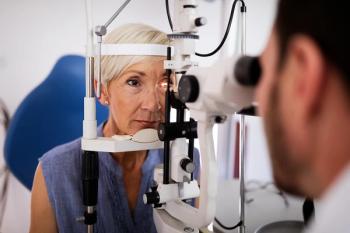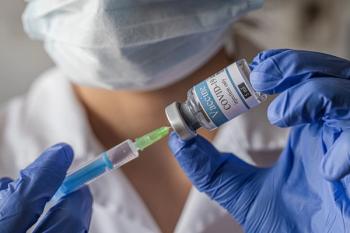
- Optometry Times Vol. 10 No. 11
- Volume 10
- Issue 11
Q&A: Cornea, almost two residencies, and a Vietnamese hoagie
Meet Clark Y. Chang, OD, MSA, MSc, FAAO, director of specialty contact lenses at Wills Eye Hospital, and director of clinical services at TLC Laser Eye Centers.
Where did you grow up?
I grew up in Vancouver, Canada. My parents were in the financial industry, currency and futures exchange. I was born in Taiwan, and when I was very young, I would carry money in a bag for my parents and transfer the funds from branch to branch. I would have millions of New Taiwanese dollars. It was a lot less in U.S. dollars, but it was a big amount of money for a little kid. It was a lot of fun and anxiety ridden as well. I was their money-mule. [Laughs]
Why did you go to school in the U.S., and why did you decide to stay?
I didn’t know what I wanted to become. I graduated from an animal biology major thinking I was going to be a veterinarian. I got a master’s degree in business administration, but I wasn’t sure what to do. I knew I wanted to do something in health care, so, I decided to find jobs in different health clinics and see which I liked the most. I ended up staying at an optometry clinic in Vancouver for several years, then I decided this is something I should do because I enjoy it.
Hanif Paroo, OD, stood out for me there, and I had lot of after-hours inspirational conversations with him. I thought if I could become anywhere close to the type of doctor he is, I would be happy. His alma mater Salus University was my first choice. When I graduated, I did a residency in primary care, then afterward I thought I want to do more; I’m not ready to go home yet. I obtained a fellowship in cornea and contact lenses in Teaneck, NJ, because I was attracted to the mixture of academia, research, and private clinic. I stayed in that clinic for close to nine years.
Why academia and not private practice?
If I had gone back to Canada after my residency, I would have enjoyed private practice. I remember that my mentors told me the best way to learn is to teach. [Laughs] The longer I stayed in an academic setting, I realized it was true. I enjoy being able to process material that may not be digestible for other people, then transfer it in a simpler content to see other people learning with me. That is very gratifying, and I’m not sure I would get that in private practice.
How did the cornea become your passion, and why specialty contact lenses?
Going through clinics during my rotation, I saw a lot of cornea patients who needed contact lenses. I thought that it’s such a circle of comprehensive care that we can give our patients. A lot of patients need this type of service that’s not available because we’re in tune with diabetic retinopathy, macular degeneration, and what interventions people need. A lot of things are geared toward retina and glaucoma. Cornea almost sounds like a foreign concept to eyecare professionals. I feel that is an area people don’t pay much attention to when patients are in need of care. We don’t have a lot of contact lens specialists around the country. I could take care of patients from front to end in this area, while I would be restricted in other disciplines.
What keeps you engaged in research?
You receive the reward of research at the end where you find your patient meeting your primary study endpoint. When you find a new modality or methodology is working and your patients are doing better compared to everyone else’s, it’s very satisfying. It becomes addicting where you want to improve something or search for new, different treatment methods that other people may not have looked at before. That keeps me wanting to stay connected with academic research.
How did you develop your lecture style?
I’m really prepared with my content, but I was never quite prepared with my style. I didn’t have enough time to take care of both; I could focus only on new information that I want to share with colleagues. I let whatever feels natural to me come to the podium. Some people love me, some people don’t. I find it humbling to look at the course review because people care enough to give you constructive criticism. I want to see what was resonating with people and what wasn’t. I do make a conscious effort in refining the style, but at the beginning I was more content driven. So when my delivery style comes from my personality, I kind of let it fly.
What’s something your colleagues don’t know about you?
Optometry wasn’t my first choice-I wanted to go to culinary school. I thought if I couldn’t find a way to get into culinary school, I would then try optometry. [Laughs] And I never tried to find out how to get involved with a culinary institute. Dr. Paroo got me back on track to optometry. Not that I would be a good chef. [Laughs]
What’s your guilty pleasure food?
There are so many because I enjoy eating so much. I love simple ingredients, I love freshness that you can taste with each bite, and I find that in a lot of mom-and-pop shops. So, a Vietnamese hoagie with spicy marinated vegetables on top, complimented with a cup of really dark, strong Vietnamese coffee laced with condensed milk. That combination would be my guilty pleasure.
Where do you see yourself 10 years from now?
I can barely see myself a year from now. It’s hard to project that far ahead. In 10 years, I hope I slow down a little even though I’m nowhere near retirement age. There has been a lot of travel in the course of my career, which I appreciate, but it does take a toll. I would love to become a liaison between new research and my colleagues in our optometric community. I would love to continue to represent optometry, whether it’s at the podium of an optometry meeting or an ophthalmology meeting. In ten years, I’ll come back to listen to this podcast and see if that has happened. [Laughs]
Do you have any regrets?
In the back of my mind, I have a space for regretting that I didn’t choose optometry sooner. It is possible that I would have done my four years of training, then not even talk of a residency and fellowship afterward and go back to private practice in Canada. Perhaps everything worked out for the best.
What’s something about optometry you’d like to change?
I didn’t realize I would enjoy research as much as I do. We have so much information to learn in such a short period in the traditional optometric curriculum that there is no time to appreciate what good clinical is, what makes a study generate manipulated data as objectively as possible, how that is applied to real-life practice, and how it impacts patients. I know our curriculum is packed, but I would love to get people to understand and be more interested in participating in research.
What was the craziest thing you’ve ever done?
I’ve always been told how crazy I am for wanting to a residency, and afterward, still feeling like that wasn’t enough knowledge for me, wanting to go for more. I actually offered to do a second residency. It was shocking my friends who knew I was going to give up another two years of pay, because I actually did a two-year fellowship because one year wasn’t enough, in exchange for more knowledge. [Laughs]
Articles in this issue
about 7 years ago
How to handle non-ophthalmic emergenciesabout 7 years ago
Imaging aids in differential diagnosis of uncommon diseaseabout 7 years ago
Why doctors are rethinking AMD standardsover 7 years ago
Know the link between cotton wool spot and anemiaover 7 years ago
Knowing when to delegate testing responsibilitiesover 7 years ago
How hyperopes differ from myopesover 7 years ago
When to refer patients with diabetic retinopathyover 7 years ago
Dialogue with lecturers at CEover 7 years ago
5 steps to manage cataract patient expectationsNewsletter
Want more insights like this? Subscribe to Optometry Times and get clinical pearls and practice tips delivered straight to your inbox.




























